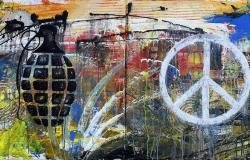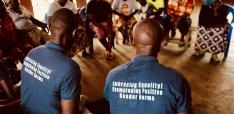War or Peace: Which Do You Choose?

Having a son turned me into a pacifist not because I was an idealist, but because motherhood made me a realist.
Why are we raising our children in a culture saturated with violence?
Every week, sometimes twice a week, sometimes more often, there is another mass shooting, always by a man, usually a white man. 54% of these mass shootings involve domestic violence. Gun violence, violence against women and mass violence go hand in hand.
Turn on the news: violence. In popular movies, violence becomes entertainment. Video games are driven by violence. Violence against women is the mainstay of pornography. Women who testify to sexual abuse are called liars. Our President thrives in this culture of violence, fear and male domination. Because of gun violence Amnesty international recently issued a travel warning for the USA.
The shootings make front page news, but what are we doing to combat them or the endemic violence of our culture? What messages and values are we instilling in our children about adulthood, citizenship, what it means to be a man - and a human?
I know something about violence. As a sexual abuse survivor growing up in New York City in the 1980s, the threat of violence was always close. I walked down the street aware of each man around me, ready to run, scream, and kick if necessary. At night, through our windows, we sometimes heard the high-pitched screams of women crying for help.
As a girl and young woman, I sorted men into two groups: violent and not. My goal was to stay as far away from men who might not be safe. My inner world was built in part on navigating the inconvenient dangers of violence, on making unsafety more bearable. I skirted my father’s violent temper and dismissed its severity. After all, this was the world I lived in, and I learned to cope.
But then motherhood gave me a new perspective. Having Gabriel, my son, I didn’t want to cope; I wanted a different world for my child.
Then came 9/11. The rhetoric of violence around the attacks made no sense to me. As I mourned for the people who had died in New York, I imagined children like my own becoming civilian casualties in a war started to prevent similar atrocities. I imagined soldiers, other mother’s sons, as loved as Gabriel, losing their lives.
I thought of George Orwell’s famous slogan “war is peace” from 1984, and understood that war cannot be or bring peace; that when we meet violence with violence we continue the cycle of tragedy. Being the mother of a son turned me into a pacifist not because I was an idealist, but because motherhood made me a realist.
Indeed, if the rationale for fighting wars in Iraq and Afghanistan was that it would make America safer, it failed. More than 5.6 trillion dollars and tens of thousands of deaths later, the Middle East is significantly more, not less, unstable than it was, and there is significantly more terrorism in the world, not less.
Being a pacifist does not mean that we are passive. It means that we learn how to address violence at the root, and how to respond to violence with other means and skills. It means that we are trained and socialized, from the time we are young, to learn that there are other, better ways of dealing with the challenges we face.
“We must begin to inculcate our children against militarism,” Albert Einstein wrote, “by educating them in the spirit of pacifism. Our schoolbooks glorify war and conceal its horror. I would teach peace rather than war.”
When Gabriel was old enough to play games we made a rule: we wouldn’t buy weapons. Still, he made his own guns from sticks, fingers or broomsticks. And tiny guns still entered our house as parts of his toys: at one point, we went through all his legos and playmos and gathered together dozens of guns, spears and knives.
We tried to mitigate the violent stories he heard, and though we talked about current events, we stopped listening to the news when he was around. We limited what he was able to watch, and tried to steer him away from highly competitive sports.
When Gabriel came home from school with stories about how being a boy meant that you were part of a group that was ranked in order of power on the playground, we were concerned, and eventually he changed schools.
Gabriel grew out of his child’s make-believe fighting games. He became, as he was as a child, a thoughtful, kind, loving person, committed to making the world a better place. His high school, a diverse public school that emphasized social justice, gave him a great education, but still, the history of war and violence was given much more time in class than the history of peace movements. Stories of conflict in literature class were given much more time than stories of caring or healing.
Now Gabriel is on his way to college - a rite of passage into adulthood in our culture. But there’s another silent rite of passage for young men in the USA: like all young men of his age, Gabriel also needed to sign up for “selective service” in case there’s a future draft.
The moment our boys reach adulthood, they are given a number in case our country enters a war so they can be called up to fight. Individually, we may raise our children to practice peace, but our culture is in constant preparation for war and still thinks of young men as potential fodder.
I wake up in the middle of the night sometimes, scared of what it means to raise children in a violent world. None of us wants to see our son or daughter lying dead on the floor of the mall, the school, the office or the battleground. None of us want to see our children killed by a tsunami, a fire, a landslide or a flood. It’s time to act accordingly.
All parents try to keep their children safe. But the responsibility of raising children can’t all be left to parents. It’s no wonder that so many young men turn to violence when everywhere they look, they are met with confusing messages that celebrate violence and equate violence with manhood.
Can we provide an alternative voice and vision? The louder the language of dominance coming from the White House and those who support President Trump’s agenda, the louder the rest of us must be in showing up the dangers and impracticalities of violence, and offering another way.
We simply cannot afford not to reject violent models. We need immediate and sweeping gun law reform. We need to reconsider our military culture and take the air out of our ever-ballooning Pentagon Budget and the growing arms race it fuels. And we need to re-examine our own relationships to violence and power and life itself.
Today, we are facing perhaps the greatest existential challenge humanity has ever faced: the climate crisis, a global level of catastrophic upheaval. The climate crisis itself is a product of a violent attitude towards the earth: we extract from, ravage and pollute the earth in the same way we have treated subjugated people. And climate change will lead to even more instability and violence.
The truth is, no amount of violence can solve this problem. Indeed, our obsession with violence only takes us further away from finding real solutions. It is only by working together, cooperating, thinking on a global scale, and prioritizing the value of life itself that we can meet the climate crisis.
We are learning, for example, that restoring forests and eating less (or no) meat can greatly mitigate climate change. Rather than using violent language like “combating climate change” which suggests that we need to live in a state of strife, we can emphasize how valuing the world around us leads to more effective outcomes for everyone. Rather than viewing young men as potential fighters, young women as potential sex objects, and forests and animals and oceans and natural resources as commodities to be extracted, let’s think of all life as part of an ecosystem where each element has its own inherent value.
As Gabriel heads off to college and we reminisce about key moments in his childhood, prepare his favorite foods, talk about what classes he’ll take, give last-minute advice, and make sure we have those college XL twin sheets, it’s also a moment to think on a larger scale about what we want for all young men and women.
Like new parents, we can and must shift our priorities and re-imagine the world and our place in it. It’s people of Gabriel’s generation who are leading the way in a new environmental movement, and it’s time for the rest of us to follow their lead. We must loudly and clearly reject violence and the culture of militarism for our children. We must put away all tools of destruction and bring out new ones to build a healthier and more sustainable environment - around and within us.
Nadia Colburn's writing has appeared in The New Yorker, The LA Review of Books, Truthout, Spirituality & Healthand elsewhere. Her poetry book The High Shelf is forthcoming this fall. For free downloads and more information visit nadiacolburn.com.
This post first appeared on:
Image credit: Staff Sgt. Jamal Sutter Via Wikimedia Commons. CC0 Public Domain.



